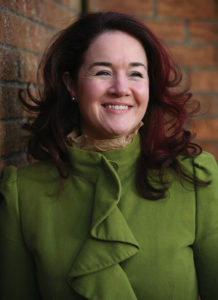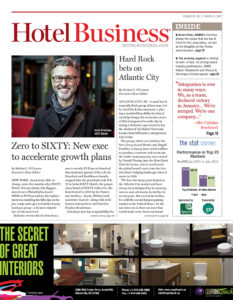NATIONAL REPORT—Winning more conference and group business is a top priority for any hotel with space to rent out. Selling the available square footage to an event planner requires a sense of awareness—the ability to mirror and ask the right questions. There’s also another aspect sales managers often neglect: the partnership. Educating planners on how to overcome challenges and solve problems germinates this bond.
“Planners really are no longer interested in listening to a sales pitch, and there’s a lot of sales pitches going on out there,” said Ciara Feely, a hotel conference sales specialist. “Planners really need to have a certain level of trust and confidence with a hotel or venue first, and then they’ll listen to the sales pitch.”
Under a lot of pressure, sales managers on many occasions rush right into the sales pitch, ignoring initial signs of planners seeking more than just transactions. Nurturing the beginnings of the conversation is essential to delivering the kind of relationship the event planner expects to have with the sales manager. Sitting across from the salesperson, a planner more often than not will think: “This person is going to be key in me delivering what I need to deliver with this event,” said Feely, who has authored Steps to Win, a book on how sales managers can sell more in the meetings market.
With the end goal being the formation of a two-way relationship, it’s essential for the sales manager to sidestep interacting with the planner as a supplier. When a planner views a salesperson as a supplier instead of a partner, the conversation typically revolves around rates, which isn’t always at the top of a planner’s mind. “Some planners will go into conversations thinking that, but once you help them to realign, and once you help them to have clarity on what’s most important about an event, then the conversation changes,” she explained, noting she’s never met a planner who has been focused solely on booking the cheapest rate at a venue for an event or meeting.
Trust is acquired by being a good listener, always paying close attention to the needs and wants of the planner. As basic as it sounds, it’s usually a missing link in discussions. “Sometimes, I see confusion on the hotel sales manager side where they think being ‘liked’ and having a friendly relationship is being ‘trusted,’” said Amy Infante, managing principal at Plan B Consultants Inc., marketed as a business development solution for the hospitality industry. “A friendly, hospitable relationship with every potential buyer is critical, but more important to kicking off a partnership and gaining actual business is to first be relevant. In order to be relevant, managers need to know what is important. And to know what is important, there needs to be conversations with planners.”
Creating a neutral trust is essential to getting the second meeting (which should be the goal for any sales manager). Save the sales pitch for later on down the road, Feely suggested. Asking the right questions will guide sales managers to where they need to go in terms of finding out the wants and needs of planners—specifically, the planner they’re sitting across from and hoping to do business with. “You have to get people’s attention and then keep their interest. We do that by being educators,” she said.
Think of it from the planner’s perspective: Event planners are trusting the hotel or venue with their reputations, as well as the reputations of their clients. The wrong venue choice could permanently damage a company’s organization. “Brands cost hundreds of thousands of dollars to build,” Feely said.
“One of my business mentors always says, ‘Conversations create cash,’ and that is a critical step in the industry that is oftentimes—and sadly—missed,” Infante added. “We can be so transactional in our hectic days that we forget how much can be accomplished by simply asking the right questions.”
Too much information right away, also known as dumping on the client, can scare the planner off—essentially losing a sales opportunity due to carelessness. The key, again, is pulling information out from the planner—not overwhelming the individual with property details. “Again, this comes from the energy of ‘taking’ rather than ‘giving,’ and any buyer gets turned off by this immediately,” Infante said. “The goal of a conversation is to understand fully what is important to the planner first, and then deliver the features that are relevant to them. There should be a flow to the conversation and an easy dialogue. Share relatable stories and examples that help them understand how the property and service would be a great fit for their needs.”
Sales managers can gain a better idea of what planners want by conversing with them more often if possible. By doing this, sales teams will gain a better understanding of how they can make themselves more relevant to planners. “I believe strongly that data and business intelligence come from more dialogue with the buyers,” Infante said. “It allows our hotel partners to then deliver credible content and marketing information that truly matters to clients. Again, it’s back to relevancy, credibility and, ultimately, trust.”
Hotels aren’t just supplying space for events; they’re providing their own expertise on events to planners. For instance, many planners are aware of shorter attention spans at meetings. There’s already an abundance of free information available on the internet. Attendees no longer want to be preached to at events and conferences; they want to interact. “I feel there’s a big responsibility on hotels and venues to help connect people and help make those per-chance meetings happen a little bit more,” Feely said. Sales managers who can offer solutions to planners for obstacles will already be ahead.
“The best approach is coming from the energy of ‘giving’ rather than thinking about hitting your numbers and closing,” Infante said. “At the end of any initial conversation where you’re qualifying the planner and their future needs, just ask them how they like to interact. Find out what they are comfortable with and be authentic and available to serve. It’s critical to know and understand their timeline, and what they have to go through internally to make their event happen. Be of service to them throughout their process.” HB



